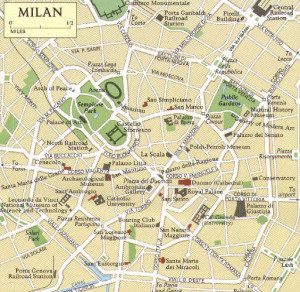Where should the London branch of the central division of the Unified Patent Court (UPC) go, if it has to be relocated due to the Brexit vote in the UK? To Milan? The Hague? Brussels? Any other city? Public lobbying has started in Italy with a letter of the Industrial Property Consultants Institute. The organization has requested the Italian prime minister, various other ministers and regional leaders in Lombardy that they bid for Milan to replace London.
Since the UK voted in its 23 June referendum to leave the European Union, the future of the Unitary Patent (UP) and the Unified Patent Court is very uncertain. Some think the UP system is dead, many others say it will be delayed, and a lot of debates and activities, partly behind closed doors, centre on the possibility to keep the UK in the Unitary Patent system.
Also, many observers have pointed out that – if the UK leaves the UP system – relocation of the London seat of the UPC’s central division (the two others are Munich and Paris) will be necessary and that this is likely to be a contentious issue. Two months before the UK referendum, Jan-Diederik Lindemans of Crowell & Moring wrote in an article on this blog: ‘The decision of where to place the three central divisions was a politically sensitive one – the Netherlands and Germany, for example, were left feeling deprived. If the British leave the EU and, as a consequence, the UPC system as it currently stands, it can be assumed that there will be fierce lobbying by several UPC contracting parties to take the central division away from London. Apart from the prestige, there are of course enormous economic benefits attached to the choice of a possible successor for London (real estate, jobs, suppliers, hospitality, etc.) According to some studies this economic benefit could amount to some 200 million euro a year.’

L’Ordine dei Consulenti in Proprietà Industriale in Italy has now openly started lobbying, with a letter of 23 August 2016 to the Italian prime minister and a number of other ministers and regional leaders. It explains that ‘due to the UK’s Brexit vote, the opportunity has arisen to transfer the London seat of the central division to Milan’.
According to the institute, there are many reasons why Milano is a natural candidate to replace London. ‘If the UK leaves the EU, Italy will be the third EU country as to the number of validated European patents in its territory. Secondly, (…) ratification by our country of the UPCA will become essential for the Unitary Patent system to get underway.’
It points out that Italy is among the first EU countries in the number of European patent, trademarks and designs applications and is therefore paying a high contribution to the system. ‘Nevertheless, our country doesn’t host any European institution in the field of Industrial Property’. The relocation of the London seat of the central division to Milan ‘would repair the current imbalance’, according to the letter of L’Ordine dei Consulenti in Proprietà Industriale.
Strikingly, in the April 2016 article of Jan-Diederik Lindemans the presence of other European institutions is put forward as an argument that Brussels ‘should not be overlooked’ as a possible new home for the central division. It is an ‘experienced expert’, according to Lindemans. He mentions other advantages as well: the geographic location and accessibility, the ‘highly educated professional population, most of which is extremely proficient in both English and French’ and the fact that Brussels is cheaper than other obvious locations. Also, ‘Brussels and its surroundings form one of the largest key centers for the European pharmaceutical industry.’
‘The discussion about a new location for the London part of the Central Division is very premature’, according to Pieter Callens, senior attorney at Eubelius in Brussels and co-author of an upcoming book on the UP system. Contacted by Kluwer IP Law, he says that currently the only important issue is how will be dealt with the Brexit vote. Does the UK still want to be part of the Unitary Patent system, even as a non-EU-member? Is that possible and acceptable to the other member states and what amendments to the system will be necessary? ‘Hopefully the UK can stay in, I think that would be a far better option for everybody’, according to Callens.
Wouter Pors, partner of Bird & Bird and secretary of the Dutch Group of the International Association for the Protection of Intellectual Property (AIPPI), agrees. According to Pors, the Italians already claimed the central division during a congress in Milan less than a week after the Brexit vote – to the annoyance of several attendants who had worked on the UP system for a decade and were still in shock over the outcome of the UK referendum.
Pieter Callens is not impressed with the arguments put forward by the Italian Industrial Property Consultants Institute. ‘They point at the number of patent applications and validations as argument for Milan. But we’re discussing a court division here, and the Italian judicial system (although much improvement can be noticed) is still not an example for efficient court proceedings. Court cases tend to be lengthy and slow. And although the central division is of course not an Italian court, I think there may be concerns that Italian habits will be imported into the UPC system.’ Apart from this, Callens thinks it’s rather questionable for the Italians to claim the division for Milan without any reference to the fact that Italy has long been a fierce opponent of the UPC system and has joint Spain in its nullity proceedings before the CJEU.
As to lobbying for Brussels, Callens has no information that the Belgium government is going that route. ‘I haven’t heard of any informal or formal proposals and personally I think the Belgian government and administration also find this discussion to be premature. Discussions now on such a sensitive issue could have a negative impact on the whole project. I think we shouldn’t create new points of controversy at a moment that the Unitary Patent system is in heavy weather due to the Brexit.’
 Wouter Pors expects more clarity on the future of the system by October. He thinks Milan and The Hague are the only serious candidates for the central division if the UP system loses the UK as a member state. But just like Callens and probably the overwhelming majority of patent professionals in the EU, he hopes the UK can be kept inside. ‘If the UK is prepared to ratify the UPCA, thereby accepting the uncertainties about its position in the UP system after leaving the EU, at least it should get the guarantee that it can keep the seat of the central division.’
Wouter Pors expects more clarity on the future of the system by October. He thinks Milan and The Hague are the only serious candidates for the central division if the UP system loses the UK as a member state. But just like Callens and probably the overwhelming majority of patent professionals in the EU, he hopes the UK can be kept inside. ‘If the UK is prepared to ratify the UPCA, thereby accepting the uncertainties about its position in the UP system after leaving the EU, at least it should get the guarantee that it can keep the seat of the central division.’
‘Now is not the moment to discuss the relocation of the London seat’, he says. It seems to be the position of the Dutch government as well. A spokesman of the Ministry of Economic Affairs declined to comment on the issue: ‘It is for the British to act now. Of course, we haven’t stop thinking here, but at this stage we do not want to speculate on possible scenarios.’ According to the L’Ordine dei Consulenti in Proprietà Industriale, the Italian Ministry of Justice has informed them ‘that the issue in question is being evaluated’.
For regular updates on the Unitary Patent and the Unified Patent Court, subscribe to this blog and the free Kluwer IP Law Newsletter.
UPDATE OF 16 SEPTEMBER 2016: In answer to reactions on this post, the author contacted Pieter Callens. Mr. Callens wishes to clarify that in referring to “Italian habits”, he was referring to the slow functioning of certain judicial procedures in Italy. Despite improvements in recent years, certain Italian proceedings can in some occasions be slow. Mr. Callens and the author of the article thought this was clear from the context in which he made this remark. He regrets any misunderstandings of his statements and wishes to apologize to those who interpreted his statement otherwise or even as an offence against Italian practioners or the Italian people, which was never meant. The whole point Mr. Callens wanted to make is that the Unitary Patent package should avoid any quarrels between member states right now. For industry and patent practioners the most important thing is that the UPC and the Unitary Patent become operational as soon as possible. Discussions on moving the seat of the Central Division to other member states is preliminary and even dangerous. Mr. Callens thinks it is very important to make a united effort in getting the UP system started.
________________________
To make sure you do not miss out on regular updates from the Kluwer Patent Blog, please subscribe here.



If Belgians don’t like Italian habits they always can go to defend their “french” fries in Paris or Munich, we will not miss them.
The real problem is if BREXIT has been a bluff or not.
If yes, GB (UK) will not leave EC but UP/UPC will start with some delay due to necessity for UK to convince people to stay inside EC.
If not, UK will leave but will wait for some pressure of other countries to leave EC. In this case it is required some cooperation among, for instance, Germany, France, Italy, etc.
Mr. Callens is quoted as saying “I think there may be concerns that Italian habits will be imported into the UPC system.”
What “Italian habits” are we talking about??? In a world where we risk having Donald Trump (with all that comes with it in terms of lack of openness to other cultures) as the president of the US, I think that Mr. Callens’ choice of words is extraordinarily unfortunate (not to say shameful).
If Mr. Callens was quoted accurately, I demand an apology from him.
If he was not quoted accurately, I demand an apology from the Kluwers Patent Blog.
Either way, I think the Kluwers Patent Blog should have a policy of only commenting on the law, and not on countries or those countries’ alleged “habits”.
Fully share Micaela comments and equally ask for a urgent reply either by Mr. Collins or the Editor.
As Italian citizen, I am very annoyed by the comments of Mr. Callens on alleged “Italian habits”; I think that such comments (assuming that they were reported correctly) are certainly in line with the unitary spirit of the UPC….
From my point of view there is no danger of a lack of efficency if the actual London part of the Central Division of the UPC shall move to Italy. Italy – a founding member of the EU (see: The Roman Treaties) – has got only the European Food Safety agency in Parma as an European Authority. Belgium on the other side hosts with Brussels the European Capital with Commission, Council and (in part with Strasbourg) the European Parliament. Additionally, I strongly oppose to the view that Italian patent judiciary is ineffective. As far as it relates to Milano the opposite is true: Excellent personal such as Marina Anna Tavassi and also efficient proceedings assure a high quality of Milano patent court decisions. I’m sure the same will happen to future UPC decisions from Milano, maybe from a relocated Central Division part.